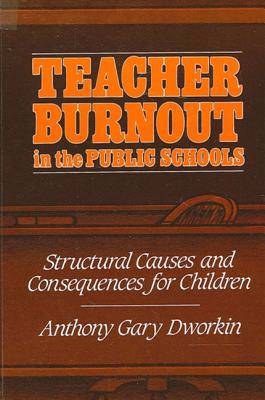
Bedankt voor het vertrouwen het afgelopen jaar! Om jou te bedanken bieden we GRATIS verzending (in België) aan op alles gedurende de hele maand januari.
- Afhalen na 1 uur in een winkel met voorraad
- Gratis thuislevering in België
- Ruim aanbod met 7 miljoen producten
Bedankt voor het vertrouwen het afgelopen jaar! Om jou te bedanken bieden we GRATIS verzending (in België) aan op alles gedurende de hele maand januari.
- Afhalen na 1 uur in een winkel met voorraad
- Gratis thuislevering in België
- Ruim aanbod met 7 miljoen producten
Zoeken
Teacher Burnout in the Public Schools
Structural Causes and Consequences for Children
€ 145,45
+ 290 punten
Omschrijving
This unique study is the first large-scale sociological analysis of teacher burnout, linking it with alienation, commitment, and turnover in the educational profession. In the process of doing so, Anthony Gary Dworkin uncovers some startling trends that challenge previous assumptions held by public school administrators. Urban public school districts spend up to several million dollars annually on programs intended to rekindle enthusiasm among their teachers, hoping thereby to reduce the turnover rates. They also assume that enthusiastic teachers will heighten student achievement. Yet data presented in Teacher Burnout in the Public Schools challenge these suppositions. Dworkin's research shows teacher entrapment, rather than teacher turnover, as the greater problem in education today. Teachers are now more likely to spend their entire working lifetime disliking their careers (and sometimes their students), rather than quitting their jobs, and Dworkin proposes that principals, more than any other school personnel, can do much to break the functional linkage between school-related stress and teacher burnout. The author's findings also indicate that burned-out teachers pose a minimal threat to the achievement of most children, but that they do have an adverse impact on brighter students. Teacher Burnout in the Public Schools includes an inventory of supported propositions and three levels of policy recommendations. These important policy recommendations suggest substantial organizational changes in the nature of the training of public school teachers in the college educational curriculum, in the teacher employment and deployment practices of school districts, as well as in the administrative style of school principals.
Specificaties
Betrokkenen
- Uitgeverij:
Inhoud
- Aantal bladzijden:
- 241
- Taal:
- Engels
- Reeks:
Eigenschappen
- Productcode (EAN):
- 9780887063480
- Verschijningsdatum:
- 15/12/1986
- Uitvoering:
- Hardcover
- Formaat:
- Genaaid
- Gewicht:
- 480 g

Alleen bij Standaard Boekhandel
+ 290 punten op je klantenkaart van Standaard Boekhandel
Beoordelingen
We publiceren alleen reviews die voldoen aan de voorwaarden voor reviews. Bekijk onze voorwaarden voor reviews.











